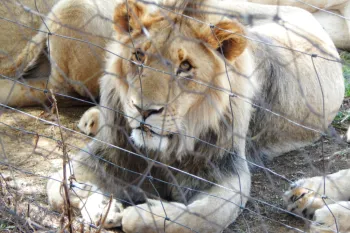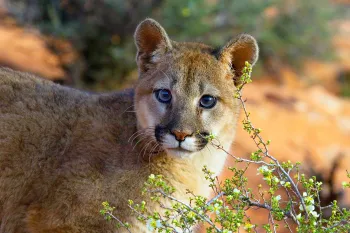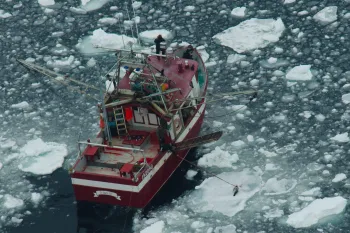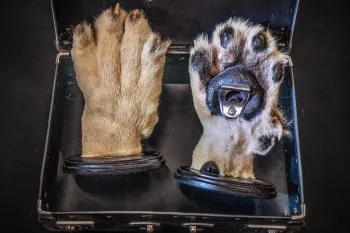BRUSSELS—Ten years ago on July 1, 2015, an American hunter seeking a trophy shot an arrow at an African lion named Cecil just outside the boundaries of Hwange National Park in Zimbabwe. The senseless killing of Cecil, a lion who was being studied by scientists and beloved by park visitors, created a global debate over the ethics of trophy hunting and made news headlines around the world. Yet other lions like Mopane who was gunned down in the same area in 2021, and Cecil’s son Xanda killed in 2017, continued to fall victim to the same senseless practice of killing majestic wild animals for trophies and bragging rights.
A decade of unwavering campaign effort by Humane World for Animals (formerly known as Humane Society International) has spurred a movement toward ending Europe’s complacency in —and its facilitation of—the international trophy hunting of species already threatened by trade. Now, on the 10th anniversary of Cecil’s death, the organization continues to call for European member states to follow other nations in adopting regulations to end the import of hunting trophies into their own countries. The EU is the second largest importer of trophies from species listed under CITES (the Convention on International Trade in Endangered Species), importing 27,384 trophies from CITES-listed species from 2014-2023, just behind the United States. Since 2015 France, the Netherlands, Belgium and Finland have all made legal advances to ban the import of certain hunting trophies, including from lions.
The EU, on the other hand, has ignored calls for a ban on the import of trophies from endangered or protected species. This inaction makes the EU complicit in a trade that continues to harm wildlife populations, and to rob individual animals like Cecil of their very lives, all around the world.
Lions are not the only victims of trophy hunting. Other species protected under CITES, such as elephants, rhinos, leopards, zebras, hippos and giraffes, are routinely hunted and their body parts are exported as trophies to European countries.
These animals are considered “protected” under international law, yet trophy hunters are legally allowed to shoot them and carry home their heads, skins, or tusks and other body parts as souvenirs. Between 2019 and 2023 alone, more than 3,100 lion trophies were traded globally, with South Africa exporting the vast majority— nearly 90%. Over 80% of these were captive-bred lions, shot in enclosed environments with no chance of escape
“Cecil’s killing sparked global outrage and inspired action from citizens, governments and more than 40 airlines and cargo carriers that now refuse to transport hunting trophies of animals and their parts. Ten years on, other lions just like Cecil and Mopane continue to lose their lives to the same greed and cruelty,” says Ruud Tombrock, executive director, Humane World for Animals in Europe. “The EU has been painfully slow in acting on its intention to add more species to the list of hunting trophies requiring an import permit, as proposed in the Commission's 2022 Revised EU Action Plan against Wildlife Trafficking. Protecting endangered species is not optional - it is a moral and legal obligation we cannot ignore. There is no excuse for political inaction. Trophy hunting imports in the EU must be banned.”
Trophy hunting is not conservation. It is the slaughter of wild animals for profit and the commodification of the natural world at any cost. Captive breeding operations—particularly of lions—in South Africa, Thailand and other countries have been shown to feed both legal and illegal trade markets, including canned hunting—where trophy hunters legally kill animals bred and kept in captivity—and traditional Asian and African medicine markets. Following the South African governments commitment in 2021 to shut down their captive lion breeding industry, conservationists warn the highly exploitative hunting industry may now also be shifting toward other captive- bred species, including tigers, and other wild felines, to keep profits flowing.
#
Download Photos: Link
Background info:
- France (2015), the Netherlands (2016), Australia (2018), Colombia (2019), Finland (2023) and Belgium (2024) banned the import of certain hunting trophies, including lions.
- The U.S. listed the lion as threatened/endangered under the Endangered Species Act. Between 2016 and the present, the U.S. has not authorized permits for the import of lion hunting trophies from captive sources.
- South Africa’s government has committed to shutting down the lion breeding industry. This would be the biggest advancement for lions' protection given that South Africa exports the most lion trophies in the world and the majority of those are from captive sources.
- U.S., European (and France), South Africa and Argentina polls all say the majority of respondents oppose trophy hunting.
- Malawi banned the trophy hunting of lions in 2017. Costa Rica banned trophy hunting in 2016.
- Major transport and travel companies are distancing themselves from trophy hunting. All five of the world’s largest airline groups—American Airlines, United, Delta, Air France-KLM and Emirates—have imposed restrictions on transporting hunting trophies. All seven European flag carriers with policies—Air France, Finnair, ITA Airways, KLM, LOT, Swiss and TAP—have full bans. In total, 44 transport companies, including DHL, easyJet, Condor, and Ryanair, have adopted full or partial bans; 70% ban all trophies, 30% target protected species. Travel giants like Booking.com, Expedia and TUI Group have also stopped promoting trophy hunting as a tourist activity.
- In its revised EU Action Plan against Wildlife Trafficking, the European Commission committed to “Apply increased scrutiny to imports of hunting trophies (for example by: (i) exploring extending the requirement for an import permit for hunting trophies of additional species covered by Annex B of Council Regulation (EC) No 338/97; (ii) work with international partners to update available evidence on the impacts of trophy hunting on wildlife; and (iii) making opinions of the Scientific Review Group on country-species combinations for importing hunting trophies more transparent).”
About Humane World for Animals
Together, we tackle the root causes of animal cruelty and suffering to create permanent change. With millions of supporters and work happening in over 50 countries, Humane World for Animals—formerly called Humane Society International—addresses the most deeply entrenched forms of animal cruelty and suffering. As the leading voice in the animal protection space, we work to end the cruelest practices, care for animals in crisis and build a stronger animal protection movement. Driving toward the greatest global impact, we aim to achieve the vision behind our name: a more humane world. humaneworld.org



